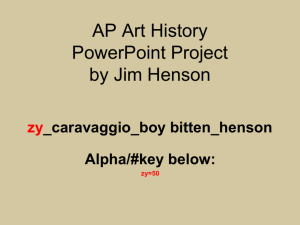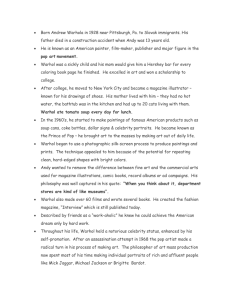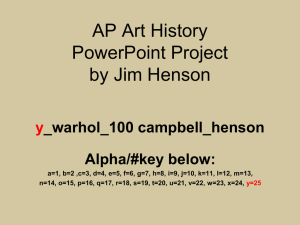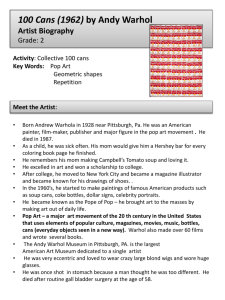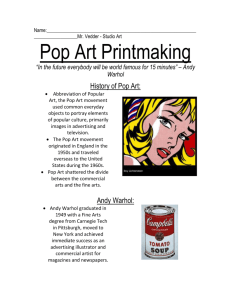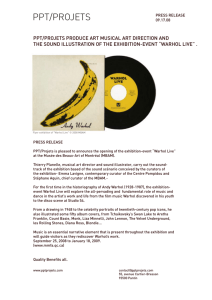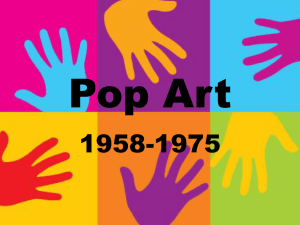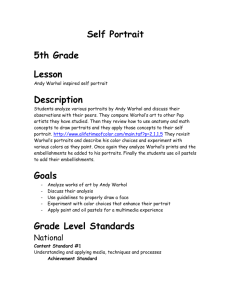Art History PowerPoint Project Artist List
advertisement
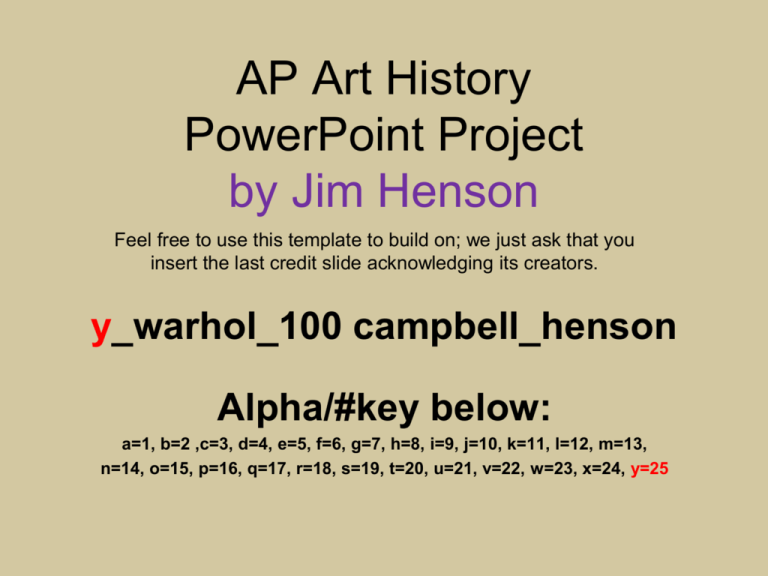
AP Art History PowerPoint Project by Jim Henson Feel free to use this template to build on; we just ask that you insert the last credit slide acknowledging its creators. y_warhol_100 campbell_henson Alpha/#key below: a=1, b=2 ,c=3, d=4, e=5, f=6, g=7, h=8, i=9, j=10, k=11, l=12, m=13, n=14, o=15, p=16, q=17, r=18, s=19, t=20, u=21, v=22, w=23, x=24, y=25 100 WELL KNOWN WORKS OF ART #25 Warhol, 100 Campbell’s Soup Cans Interpreted Using The Feldman Model of Formal Analysis Feldman’s Model of Art Criticism From the work of Edmund Burke Feldman, During the late 1960’s and early 70’s 1. DescriptionList the visual qualities of the work that are obvious and immediate. “What do you see in the artwork”? Include content and subject matter in representational worksInclude abstract elements in nonrepresentational pieces. 2. AnalysisFocus on the formal aspects of elements of art, principles of design. “How does the artist create a center of interest? How does the use of color impact the painting?” 3. InterpretationPropose ideas for possible meaning based on evidence. “What was the artist trying to communicate”? 4. JudgmentDiscuss the overall strengths/success/merit of the work. How and why has this work achieved cultural value? Andy Warhol 100 Campbell’s Soup Cans 1962 Pop Art Movement Oil painting on canvas 72”x52” New York, NY 1.DESCRIPTION a. Painting b. Oil on canvas c. 72’ x 52” d. Soup cans stacked in rows-rectangular e. Vertical/static f. Planar – respects the picture plane g. Distinct horizontal stripes-regular/repeated h. Same shapes- no variety i. Red white yellow black color scheme j. No apparent real texture/ no illusory texture k. USA- 1960s (1962- New York City) 2.ANALYSIS a. Images from advertising b. Emphasis on shape of can & color red c. Organized and stable composition d. Stacked and flat structural system e. High contrast and vibrant f. Compact shallow space-no depth g. Static and mechanical – no movement h. No shading-flat i. Balanced- symmetrical and actual size can 3. Interpretation a. Demonstrates how commercialism and advertising dominates people’s lives (“I want to be a machine”) b. Emphasizes advertising and mass production- reaction against Abstract Expressionism and continues the idea of “readymades” and collage c. Add additional commentary by the artist or critics to support the interpretation (quotes and sources or a link to your essay) 4. Judgment a. What sets this work apart and makes it worth studying? (Warhol timeline Met Museum) b. How does this work fit into the context of what came before and after it? (Development and Influence of POP) c. How have critics, historians, and the public reacted to this work? (Warhol Museum) d. How has this work changed the way art is viewed? (How Warhol Changed the World) e. Context with AP Exam: Link to AP Exam Q&A Compare and Contrast Use this slide to develop points that may be used in essays. You may also hyperlink to external essay material here: Link to British Essay Academic Essay Link Khan Academy Video Top 20 Works by Warhol Summary POP ART 1950s-1960s A style of painting and sculpture in the 1950's and 1960's; the subject matter was based on visual cliches, subject matter and impersonal style of popular mass media imagery.1 Robert Rauschenberg, Jasper Johns, Roy Lichtenstein, Andy Warhol, Claes Oldenburg, George Segal were important pop artists. Interesting Facts About Artist • • • • • • Warhol called his studio The Factory Also created experimental movies (see note below) Studied at Carnegie Institute of Technology Wrote The Philosophy of Andrew Warhol He was shot (almost to death) by one of his assistants He was very ill when he was a child and spent his time at home learning about and making art • Wanted to remove the boundaries between fine art and commercial art A still shot from the Warhol film, EMPIRE, a 1964silent, black-and-white film made by Andy Warhol. It consists of eight hours and five minutes of continuousslow motion footage of the Empire State Building . References 1. (Pop Art - Quizlet Notes-definition) http://quizlet.com/24479640/pop-art-flash-cards/ Use this space to cite sources and add links to information that is not already linked in the slides. CREDITS The template for this slide presentation is based on collected works and resources developed by Jim Henson And the Rider High School AP Art History Class of 2013/2014 All content is intended for educational purposes and images may be subject to copyright and licensing. We encourage the free use of content to further promote the study, analysis, and understanding of important images of art throughout the ages.

